|
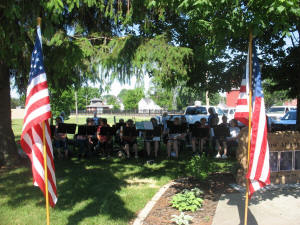
The service began with the Atlanta Band playing several patriotic
songs followed by welcoming remarks reminding everyone of the
sacrifices made by many soldiers protecting our freedoms.

Maurice “Skeet” Stribling then offered an opening prayer remembering
the “great sacrifices” of those who gave of themselves for this
country because they believed that mankind should not be oppressed,
believed evil should not triumph, and believed in freedom. He asked
a blessing on the family and friends of those who sacrificed,
praying they would have peace and comfort in their grief.
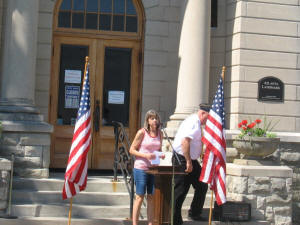
Shelly Brooks talked about the registration for veterans at the
cemetery since burial records for the cemetery were computerized a
few years ago and decided they want a complete list of their
veterans. Brooks said three years ago, there were 234 veterans
recognized as buried at the Atlanta Cemetery and now there are 350
veterans recognized as being buried there. She had a list of
veterans and asked families to help update any records.
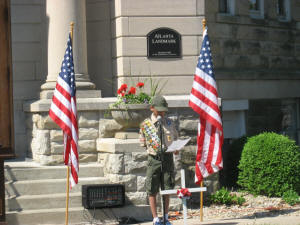
Vegeta Tanner provided the traditional reading of the Gettysburg
Address to mark the solemn occasion.
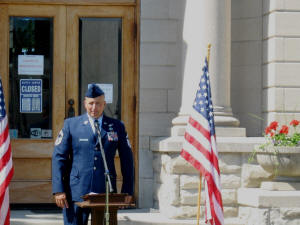
The Keynote address was given by former Atlanta resident and veteran
Dan Benedict, who now directs the Logan County Veteran’s Assistance
Commission. Senior Master Sergeant Benedict joined the Air Force in
1990 and retired in August 2013. He began his as an Electronic
Intelligence Analyst Journeyman and worked various levels of
operations during his career.
Benedict’s career highlights include keeping the Space Shuttle
Atlantis from colliding with a satellite upon re-entry into the
Earth’s atmosphere and devising a successful rescue of a downed F-17
Stealth fighter pilot. He was also involved in the development of a
Special Operations Contingency Plan for the crew of a downed ET3 in
China and worked with Navy Seals near the Iraqi border locating
Iraqi GPS Jammers and targeting them for destruction at the start of
the war.
Benedict won several medals during his service including a
Meritorious Service Award Medal with two oak leaf clusters, Joint
Service Commendation Medal, and Air Force Commendation Medal with
one oak leaf cluster.
Benedict said when he was in eighth grade, the “seed” for his future
Air Force career was planted when he heard about commercial airline
pilots, the money they made, and the travel they got to do around
the world. He got to thinking about how he could fly an airplane and
joined the Air Force at age 17.
Benedict said, “I feel humbled and a little bit nervous” because of
those not at the service who died so “I can stand here today” and
speak.

Benedict said, “My words will never be adequate enough to honor
these heroes, these veterans” in the way they truly deserve. He said
today is about honoring those who made the ultimate sacrifice.
Mothers, fathers, brothers, sisters, and many others who died
protecting and fighting for the United States of America will miss
many events such as their children’s birthdays, weddings and
graduations.
Benedict said the only testimony these people will give is in
silence through their gravestones and plaques. Today is the day of
national mourning where we need to remember the fallen and honor
those who gave their best and gave their lives for our freedom.
Benedict reminded everyone that this day is about so much more than
barbeques and sales. All that matters is, we are free to do all
those things. He said today we remember the fallen and we set this
day aside every May because their ultimate sacrifice holds no
meaning without remembrance.
[to top of second column] |

Benedict said 1.6 million Americans did not sacrifice
their lives for cookouts and sales, [but instead] sacrificed their
futures, so we may have futures that are free.
Benedict said in this country, we have the right to
speak our minds publicly without worrying that we may not be thrown
in prison or killed for our words.
Benedict said in this country, we are free to worship or not worship
as we please, unlike many countries he has been in where people risk
being kicked and beaten by a religious police force just for missing
prayers.
Benedict said we remember our heroes today. We have so many
“inalienable rights,” which are guaranteed by our Constitution and
cannot be surrendered, and the military protects these rights as it
has since 1776. He said when freedom has been threatened by enemies,
and when deterrence by our military was not enough, our country
waged war in response, battling on the land, on the sea, and in the
air.
Benedict said our freedom has been protected by people who were
drafted and volunteers who are equal on the battlefield, for death
does not discriminate.

Benedict said many in the military had hopes and
dreams and aspirations to do something. These brave men and women
are exactly like us, but they answered the nation’s call and made
the ultimate sacrifice for that which we take for granted. They
sacrificed all their tomorrows so that we may have our today and
sacrificed themselves for our freedoms.
Benedict said if we fail to take one tiny moment out of the 365 days
of the year, then their sacrifice was meaningless. He said it is
hard for those left behind when soldiers die protecting our
freedoms, for these deaths leave behind a hole in the hearts that
can never be filled and a rip in the fabric of their loved ones’
lives that can never be mended. Their only solace is to know their
loved one defending a life that is worth fighting for.
He said these veterans swore an oath to serve without reservation or
hesitation.
Benedict said we put flags on veteran’s graves and lower flags to
half-staff from sunrise until noon to remember the fallen, then
promptly at noon, the flag is raised to full staff to show America
still stands and freedom still reigns over our land.
In his closing remarks, Benedict said, “our freedom is not without a
price. The price was paid and born on the shoulders of vets who died
for us. Today is our day to remember them.”
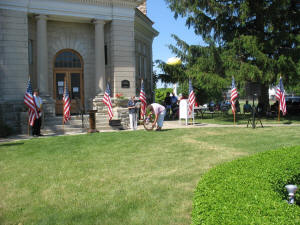
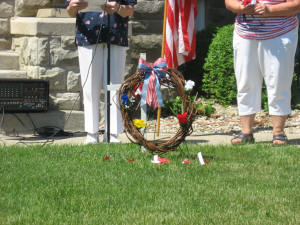
Following the keynote address, women of the Graham-Crutchley Unit
#341 Auxiliary provided a floral tribute to those who fought in all
the nation’s wars starting with the Revolutionary War. Flowers of
various colors were placed on a wreath as a tribute to those
fighting in each of the wars was read.
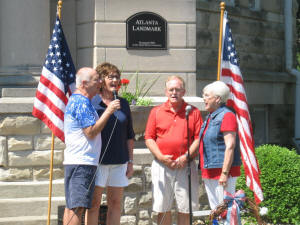
A quartet then led everyone in the National Anthem followed by a
closing prayer by Stribling. He prayed God would impress on everyone
the need to stand for values of freedom and compassion, strength and
loyalty, and remember sacrifices.
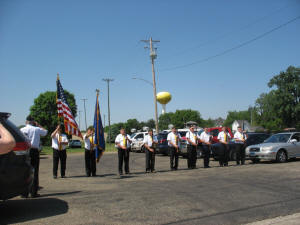
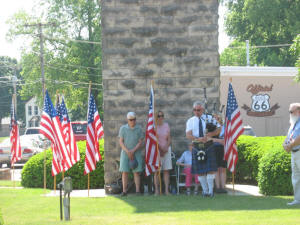
The program closed with men of the Auxiliary Honor Guard offering a
salute followed by “Taps,” then bagpipe music provided by Tom
Ogilvy.
Other events of the day in Atlanta included a luncheon at the
firehouse and the fire department taking children out to the Atlanta
Cemetery to place flowers on graves in a ceremony of remembrance.
[Angela Reiners] |